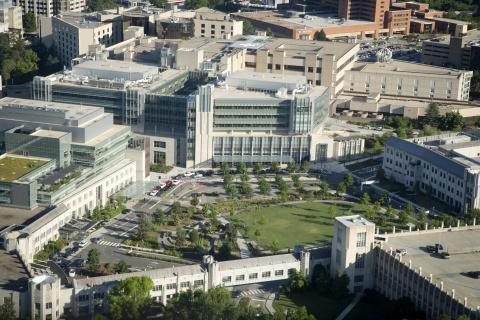
Photo above: Aerial shot of Duke University Hospital and Duke Medical Pavilion
Transplantation remains the last hope for many patients with end-stage organ failure. However, the COVID-19 pandemic has resulted in a nationwide decrease in transplants and organ donation. A recent study in The Lancet reported that deceased donor organ transplants in the United States have decreased by 51.1%. Many transplant centers have suspended procedures and limited organ donations to minimize the risk of SARS-CoV-2 transmission to immunocompromised transplant patients.

Professor and Chief of Abdominal Transplant Surgery
The Duke transplantation program has implemented new safety precautions to ensure that surgeons can still perform life-saving transplants while protecting vulnerable patients from COVID-19. When Duke introduced rapid, point-of-care testing in April, patients could be screened for the virus within hours. This improved turnaround time has accelerated transplant surgeries that had previously been impeded by the pandemic.
“We have had only a few episodes of transplant patients acquiring COVID-19 in the community and most of the cases have been fairly mild, not requiring hospitalization,” says Dr. Debra Sudan, Professor and Chief of Abdominal Transplant Surgery. “It's been one of those things that we've been trying to be very thoughtful about, the risks versus the benefits because for some, the disease can prove fatal.”
Prioritizing Patient Risk
To prepare for a potential surge of patients with COVID-19 in the intensive care unit, surgeons strategically decided which transplants needed to proceed because of an increased risk to the patient and which transplants could be safely put on hold. This new prioritization strategy was based on diagnostic criteria that determined the severity of the patient’s illness and the likelihood of their death without a transplant.
At the onset of the pandemic, kidney and pancreas transplants were paused because back-up, life-sustaining therapies, such as dialysis and insulin treatments, were available for patients. A lack of rapid testing also delayed transplant procedures. At the time, it took 4 days to get COVID-19 testing results back if they were available at all.
The team typically averages 20 kidney transplants per month but performed only five transplants in April. Liver transplants were prioritized according to highest Model for End-Stage Liver Disease (MELD) score. In April, the team performed eight liver transplants when they typically average 12 each month. The team recognizes that these decreases in transplant volumes were due to the COVID-19 pandemic. However, patients on the wait list have not deteriorated. The team frequently monitors these patients to determine if they need to be activated for a transplant.

Associate Professor,
Division of Cardiovascular and Thoracic Surgery
While the case volume is lower for kidney, liver, and pancreas transplants this time of year compared with last year, the number of lung transplants has increased due to a higher number of lung donations in the Triangle area. So far, the COVID-19 pandemic has yet to affect lung transplantation at Duke.
“Transplant is one of the life-saving procedures that the community felt was important to continue to try and provide for folks with end-stage lung disease,” says Dr. Matthew Hartwig, Associate Professor of Surgery, Division of Cardiovascular and Thoracic Surgery. “With safety for our patients and staff at the forefront of everything that we do, we've been able to safely increase the number of people we've helped with transplant.”
Improving Patient Safety
Transplant patients are at an increased risk of severe complications from COVID-19 because of the immunosuppressive drugs they take to reduce the risk of organ rejection. To protect transplant patients from COVID-19, Duke introduced a new risk assessment to exclude organs from “hot zones” with high rates of infection. When a donor offer comes in, the transplant team looks at the zip code where the donor is from to determine the rates of infection in that area and places the organ in a low-, medium-, or high-risk category.
“We actually are very careful about the donors we're assessing and where they're coming from,” says Dr. Sudan. “We are working closely with our excellent transplant infectious disease colleagues doing our best to try to maximize the organs transplanted to help patients and, at the same time, protect them as much as we're able to from potential infection.”
To reduce the risk of virus transmission to kidney transplant patients, Duke surgeons use lower immunosuppression when possible compared with standard immunosuppressive therapies for this type of transplant. Dr. Sudan says in some cases, they choose to forgo induction therapy when the patient’s immune system has not shown evidence of antibody formation prior to transplantation.
Many other safety precautions are part of standard practices for treating immunosuppressed patients, such as wearing personal protective equipment. Following transplant surgery, patients must have limited contact with other people until their immune systems have recovered. Because of the COVID-19 pandemic, this isolation now extends to their family members and loved ones. Dr. Hartwig says the biggest challenge for patients has been the restricted visitor policy.
“You can imagine saying goodbye to your loved one as they drop you off at the hospital for a transplant and not seeing them again in person for three or four weeks or longer. It’s incredibly challenging both for the recipient as well as for their caregivers and their families.”
-Dr. Matthew Hartwig, Associate Professor of Surgery, Division of Cardiovascular and Thoracic Surgery
Dr. Hartwig says the nursing staff has gotten creative by setting up video calls with patients and their loved ones to help mitigate their stress during their hospital stay. When patients are finally able to leave the hospital following surgery, surgeons can now conduct follow-up visits via telehealth platforms when possible, saving patients a trip to the hospital and reducing their risk of virus exposure.
Enhancing Data Access
At the heart of scientific discovery and medical innovation is the communication of research findings to the broader scientific community to build consensus among experts and further the advancement of science through scholarly publishing. This is especially important when emerging infectious diseases, such as COVID-19, threaten global health.
Dr. Hartwig and Dr. Sudan both serve as Associate Editors for the American Journal of Transplantation. The AJT Editorial Office is located in the Duke Section of Surgical Disciplines under the leadership of Editor-In-Chief Dr. Allan D. Kirk, Vice Dean of the Section. In August, Dr. Sandy Feng of the University of California, San Francisco will assume the role of Editor-In-Chief while the Editorial Office will remain in the Section.
AJT recently made all COVID-19 manuscripts open access and free of charge to the scientific community, ensuring that the dissemination of knowledge about the virus was easily accessible by healthcare providers and researchers.
“I think the scientific community response has been phenomenal both on the provider side as well as on the publisher and scientific journal side,” says Dr. Hartwig. “It’s been incredible. I’ve never seen a time or a subject that has been so immediately discussed and studied in such a short period of time. As we think about the front lines, trying to disseminate best care practices for a disease process that is different from a lot of your typical viral infections and the physiological impact in the long run.”
Dr. Hartwig cautions that data published prior to peer review have led to a lot of misinformation and missing data in the press, particularly in regards to potential COVID-19 treatments. “We just have to be very careful that we understand whether what we're reading has been thoroughly vetted through the peer review process or is it more for discussion and less for direct consumption.”
Forging Ahead
As North Carolina continues to see rising cases of COVID-19, the Duke transplant team will continue to meet the growing demands of the pandemic while providing life-saving transplants to patients who have few treatment options remaining. Through support and teamwork, the team is well prepared for the challenges ahead.
“We truly have an amazing group of people here at Duke and they have gone through this just like champions,” says Dr. Sudan. She says everyone from the surgeons to the advanced practice providers, administrative assistants, nurse clinicians, pediatric providers, and colleagues in hepatology and nephrology have been phenomenal in their handling of the COVID-19 pandemic. “Across the board, it's really been amazing.”
This article was originally published in June 2020 when COVID-19 cases were increasing in North Carolina. As of October 1, 2020, North Carolina has seen a decrease in cases.
Give to Duke Surgery
A gift to the Department of Surgery is a gift of knowledge, discovery, and life.